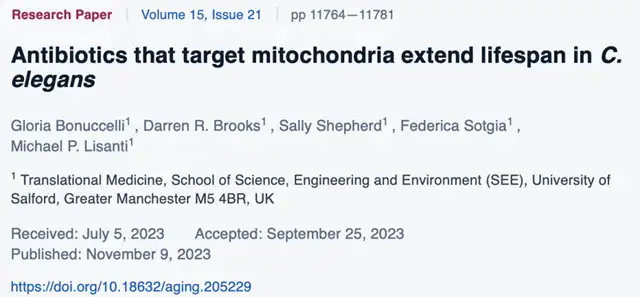Antibiotics Unveiled as Potential Life Extenders Aiding Healthier Aging
- Normal Liver Cells Found to Promote Cancer Metastasis to the Liver
- Nearly 80% Complete Remission: Breakthrough in ADC Anti-Tumor Treatment
- Vaccination Against Common Diseases May Prevent Dementia!
- New Alzheimer’s Disease (AD) Diagnosis and Staging Criteria
- Breakthrough in Alzheimer’s Disease: New Nasal Spray Halts Cognitive Decline by Targeting Toxic Protein
- Can the Tap Water at the Paris Olympics be Drunk Directly?
Antibiotics Unveiled as Potential Life Extenders Aiding Healthier Aging
- Should China be held legally responsible for the US’s $18 trillion COVID losses?
- CT Radiation Exposure Linked to Blood Cancer in Children and Adolescents
- FDA has mandated a top-level black box warning for all marketed CAR-T therapies
- Can people with high blood pressure eat peanuts?
- What is the difference between dopamine and dobutamine?
- How long can the patient live after heart stent surgery?
Antibiotics Unveiled as Potential Life Extenders Aiding Healthier Aging
For many, antibiotics are synonymous with relief from ailments such as colds, fevers, and stomach pains.
Recently, researchers from the University of Salford in the UK made a surprising discovery – common antibiotics may not only combat infections but also contribute to longevity.
Antibiotics, chemicals produced by microorganisms like bacteria and fungi, have played a pivotal role in reducing disease incidence and mortality rates caused by bacterial infections. The breakthrough in antibiotics is considered one of the greatest achievements in microbiological history and a significant advancement in modern medicine.
Traditionally recognized for their effectiveness against bacterial infections, antibiotics have now shown another intriguing capability – extending lifespan. Researchers found that administering mitochondria-targeting antibiotics, such as Doxycycline or Azithromycin, either individually or in combination, significantly slowed aging and prolonged the median lifespan of experimental animals. In contrast, Vitamin C not only failed to extend lifespan but may even elevate ATP levels, potentially accelerating aging.

Aging, a complex and inevitable process, involves the decline of almost all cellular, tissue, and organ functions in living organisms. One hallmark of aging is mitochondrial dysfunction, which has a direct correlation with the aging process. Studies have confirmed that inhibiting mitochondrial translation effectively reduces respiratory activity, thereby extending the lifespan of organisms.
To explore the impact of various compounds on lifespan and health improvement, researchers utilized the nematode Caenorhabditis elegans as an animal model due to its highly homologous genome with mammals and its short lifespan, making it suitable for scientific investigations into the aging process.
In the case of Doxycycline, a mitochondrial ribosome inhibitor, two concentrations (13μM and 130μM) were tested. The lifespan of young nematodes treated with 13μM and 130μM Doxycycline significantly increased by 72.8% and 63.64%, respectively, compared to the control group. This treatment also led to a reduction in lipofuscin content, a marker of aging, and enhanced rhythmic and sustained movement in the nematodes’ pharynx, closely related to their lifespan.
Next on stage was another common antibiotic, Azithromycin, known for its action on mitochondrial ribosomes. Results showed that treatment with 25μM and 50μM Azithromycin extended the lifespan of C. elegans by 50% and 17%, respectively, compared to the control group. Qualitative analysis of lipofuscin further revealed a decrease in lipofuscin accumulation with low-dose Azithromycin and a more substantial reduction with high-dose treatment.
In a recent study, researchers discovered that a combination of low-dose Doxycycline (1μM), Azithromycin (1μM), and Vitamin C (250μM) effectively targeted and inhibited the proliferation of breast cancer stem cells. Intrigued by this finding, the researchers investigated whether this triple combination had similar effects on lifespan and anti-aging.
Dividing the nematodes into four groups – control, combined treatment with 1μM Doxycycline and 1μM Azithromycin, treatment with 250μM Vitamin C, and triple combination treatment (1μM Doxycycline + 1μM Azithromycin + 250μM Vitamin C) – revealed that only the second group, the combination of Doxycycline and Azithromycin, significantly increased the worms’ survival, extending their lifespan by 27%. However, single Vitamin C treatment and the triple combination did not exhibit lifespan extension effects.
Moreover, the sole treatment with 250μM Vitamin C resulted in a detrimental effect, causing a decline in the nematodes’ lifespan. These worms exhibited increased lipofuscin content, reduced body movement speed, and pharyngeal pumping rate after 8 days of treatment. By day 19, some worms had succumbed to the treatment.
In contrast, worms treated with dual or triple combinations showed a reduction of around 40% in lipofuscin accumulation, maintained relatively high pharyngeal pumping rates, and normal body movement even after 19 days. Analyzing ATP levels in the nematodes revealed a significant 50% reduction in ATP levels with dual antibiotic treatment, highlighting the role of mitochondrial inhibition in cell metabolism and potential anti-tumor effects.
In conclusion, antibiotics Doxycycline and Azithromycin, acting as mitochondrial inhibitors, effectively prolonged the lifespan of C. elegans, promoting a healthier state. However, the study does not encourage indiscriminate antibiotic use, emphasizing the global health concern of antibiotic resistance. Thoughtful and rational use of antibiotics is crucial to preserve their effectiveness in combating infections.
Antibiotics Unveiled as Potential Life Extenders Aiding Healthier Aging
Reference:
Bonuccelli G, Brooks DR, Shepherd S, Sotgia F, Lisanti MP. Antibiotics that target mitochondria extend lifespan in C. elegans. Aging (Albany NY). 2023 Nov 9; 15:11764-11781. https://doi.org/10.18632/aging.205229
(source:internet, reference only)
Disclaimer of medicaltrend.org
Important Note: The information provided is for informational purposes only and should not be considered as medical advice.



